Paul turns from the battle cry in Ephesians 6:10 to the battle plan in Ephesians 6:11, 13. We must not only prepare ourselves for battle by becoming strong, we must also protect ourselves in battle by having a plan.
The battle plan has three parts. We must put on the armor of God, stand our ground, and watch out for traps laid by the devil.
Let us consider each part of the plan.
Put on Your Armor (Ephesians 6:11a, 13a)
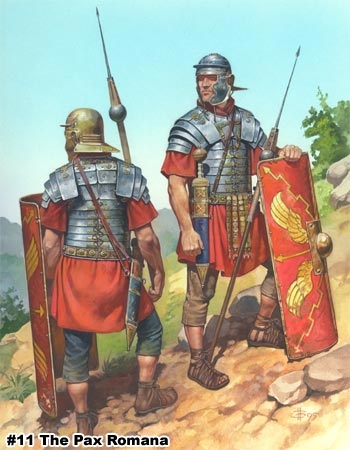 The first part of the battle plan is to put on the whole armor of God. Paul states this instruction twice in Ephesians 6:11, 13 when he writes, “Put on the whole armor of God” and “take up the whole armor of God.”
The first part of the battle plan is to put on the whole armor of God. Paul states this instruction twice in Ephesians 6:11, 13 when he writes, “Put on the whole armor of God” and “take up the whole armor of God.”
When Paul wrote these words, he was in prison in Rome and was likely chained to a Roman soldier twenty-four hours a day. Being chained to an armed guard was one of the ways the Roman military put protection and extra security around important prisoners like Paul. He had a first-hand opportunity to study and understand the importance of armor. Maybe he even talked to the soldiers about their armor.
This will be important to remember when Paul goes on to describe the armor in Ephesians 6:14-17. For now, Paul just instructs us to put on the whole armor of God.
Note that Paul doesn’t tell us that we are already wearing the armor. No, he tells us to take up and put on the armor. Though God has given His armor to us, we still need to take it up and put it on. These are commands. Christians are commanded to put on the armor. Obviously, armor sitting on the floor or stuffed the closet never did any soldier any good.
God has given His armor to each of us, by which we can protect ourselves from the enemy. But the armor does no good sitting in the closet. We must pick it up. We must put it on. We must wear it night and day until we feel naked and unprotected without it.
God has given us this wonderful gift to protect us from the enemy in this battle. Let us makes sure we use it. Take it the full armor of God and put it on.
As we discuss the various pieces of armor in future studies, we will discuss how to take it up and put it on.
Let us move on to the second part of the battle plan, which details our primary goal in this battle.
Stand Your Ground (Ephesians 6:11b, 13b, 14a)
Whenever we imagine a battlefield, we think of two opposing armies facing off against each other on the field of battle. Then, as the trumpets sound and the battle cry is shouted, the two armies charge across the field toward each other, where they meet in the middle with a clash of blood and steel. So in light of this, it would seem that Paul would tell us to “Charge!” into battle.
But he doesn’t. Instead, he tell us simply to “Stand.” In fact, Paul is so intent on making sure we know that all we are supposed to do is “Stand,” he repeats the instruction four times.
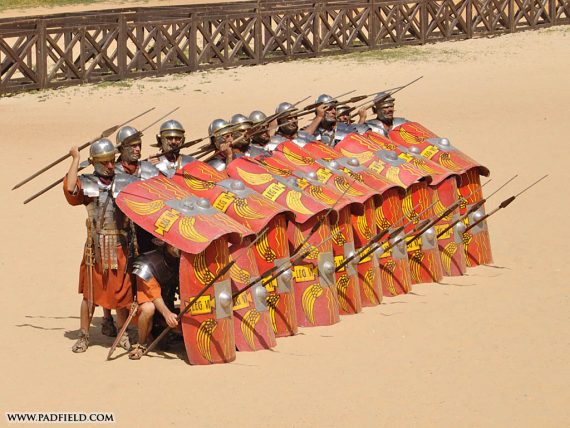
In the middle of Ephesians 6:11, he says, “… that you may be able stand …” Then in Ephesians 6:13, he writes “… that you maybe be able to withstand … and having done all, to stand.” Finally, at the beginning of Ephesians 6:14, he says, “Stand therefore …”
This is surprising, isn’t it? Most of us assume that the Christian life is all about doing things. Going places. Ministering. Serving. Teaching. Studying. Giving. Most Christians measure spiritual maturity by looking at spiritual activity. It even goes against what we sing. We like to sing the song, “Onward Christian Soldiers,” but Paul doesn’t say, “Onward!” He says, “Just stand there!”
This indicates that while Christian activity might be helpful in other arenas, when it comes to spiritual warfare, the most we should do and the best we can do, is to do nothing but stand there.
So these are the battle orders. We are to stand our ground. Don’t give up. Don’t retreat. But also don’t try to advance. Just stand our ground.
Why does Paul do this?
Why does he tell us to do nothing but stand when it comes to spiritual warfare? Why can we walk in other areas of the Christian life, but only stand in spiritual battle?
The main reason is because this spiritual battle has already been won. We don’t have to march out to meet the enemy, because the enemy is already defeated. The enemy has already been vanquished. We are the conquerors.
In fact, we are more than conquerors (Rom 8:37). Jesus Christ defeated the enemy for us. He is the victor (1 Cor 15:57; 2 Cor 2:14) and so we don’t have to advance; we just have to stand on the ground that Jesus has already won.
Part of this is because we humans, on our own, could never defeat Satan. He is much stronger and powerful than any one of us. So thankfully, God has not called on us to march out and meet the enemy that is far superior to us. He has not called us to run out onto the battlefield. He has called us to do nothing but stand on the ground that Jesus has won for us.
Jesus Christ defeated Satan for us. He is the victor on this battlefield. And all we have to do is stand on the ground He has won (Col 2:15; 1 Cor 10:12).
Indeed, standing your ground was the single greatest key to the power and might of the Roman military. While the Roman Empire did conquer the world by sending its armies into other countries to do battle, the great strength of the Roman military was that once the armored Roman soldiers were on the field of battle, their primary goal was to do nothing but stand their ground.
They had various ways of doing this. For example, the Roman military historian Vegetius writes that the smallest Roman security force was a guard unit made up of 16 men. These 16 men were spaced evenly over 36 square yards, which means there was about one every six feet or so. The soldiers were trained to focus on one thing and one thing only: They must not let a single enemy soldier enter into their six-foot square section of the battle field. Each individual soldier was given a single command: Stand your ground. Do not let the enemy into your six-foot square area.
Now this is not very much ground to cover. If you were a soldier and you were told that all you had to do in any war was cover one little six-foot by six-foot section, that doesn’t seem too hard. And it wasn’t too hard. This was the part of the genius of the Roman military power. Vegetius tells us that when arranged in this way, and when each soldier understood that all he had to do was stand his ground, his little six-by-six foot section of ground, those 16 men could stand up against 500 attacking enemies!
It is helpful to think about spiritual warfare in a similar way. When we look at all that is wrong with the world, it can be overwhelming. There are so many problems. So many battles to be fought. There is so much sin, rebellion, and evil. How can one person do anything against all of that?
But you are not called to do anything against all of that! You are commanded to simply stand your ground. To keep standing when an enemy enters into your small area of the field. You don’t need to worry about what is happening on the other end of the battle field.
All you need to focus on is what is happening in your little six-foot square area. God does not expect you to fight the swarming hoards all by yourself. It is not you against the spiritual realm of darkness.
You have been given a little tiny bit of ground. Stand in it and defend it. That’s it. Do not let a single enemy enter into your space. That is the area God has entrusted to you, and He wants you to stand your ground.
What is your six-foot square area of land?
It is your own life and the people who are in it with you. Protecting your bit of ground requires you to watch what you see, what you say, and what you think.
We can make sure that the words that proceed out of our mouths are edifying and encouraging toward others.
We can speak with honesty and truthfulness.
We can avoid gossip that tears other people down.
We can be careful about what enters into our minds through the doorway of the eyes.
We can be careful what we watch and view.
We can take our thoughts captive so that we think on what is noble, right, pure, lovely, admirable, excellent, and praiseworthy (Php 4:8).
When we live in such ways, we are standing our ground that Jesus has won for us.
But standing our ground is not as easy as it sounds.
Standing our ground requires great vigilance. We must be alert and ready. For as the defeated enemies rush off with their tails between their legs, in shame and defeat, shrieking in humiliation, they still seek to wound and damage any of us that they can. We must be on our guard, because as they go to their destruction they would love to take a few of us out as they pass by.
That is why we need to be careful. If we try to advance, rather than stand our ground, it is almost certain we will walk into a trap of the devil. Standing our ground is the safest way to avoid the snares of Satan. This is the third and final part of the battle plan, to watch out for the traps of the devil.
Watch Out For Traps (Ephesians 6:11b, 13b)
The third and final element of our battle plan is to watch out for the traps of the devil. Paul calls these the wiles of the devil.

The Greek word for wiles is methodeia, which is where we get our English word “methods.” So the wiles of the devil are the methods he uses to injure, wound, and ensnare soldiers of Jesus Christ.
In fact, Satan is so good at what he does, that sometimes, according to 1 Corinthians 11:3, 14, he appears as an angel of light. This means that sometimes, when people think they are following light and truth, they are actually following darkness and deception. It is even possible that some people think they are worshiping God, but are in fact worshiping the devil.
Therefore, it is critically important to become aware of the wiles of the devil, so that we can easily see his schemes and avoid his traps.
We must understand when these attacks come, what types of attacks the devil will throw at us, where he seeks to target us most often, and the tactics he uses with these attacks.
Though Satan has millions of specific temptations, there are only three main types.
Three Types of Traps
In 1 John 2:15-17, the Apostle John says that there are three types of traps that we can encounter in our life as Christians. He calls them the lust of the flesh, the lust of the eyes, and the pride of life. So although there are a wide variety of specific temptations and traps that the devil can throw our way, each and every one will fall into one of these three categories.
For example, in Genesis 3:6, Satan uses these same three traps on Eve. She saw that the tree was good for food (the lust of the flesh), that it was pleasing to the eyes (that’s the lust of the eyes), and that it was desirable to make one wise (that’s the pride of life).
Similarly, when Satan tempted Jesus for forty days in the wilderness, the Gospel accounts tell us that he presented Jesus with three different temptations. Satan wanted Jesus to turn stone into bread (the lust of the flesh), then showed Him all the kingdoms of the world (the lust of the eyes), and tempted Jesus to throw Himself down from the pinnacle of the temple in order to easily declare Himself as the Messiah and prove that God was working for Him (the pride of life) (See further resources here: https://redeeminggod.com/sermons/luke/luke_4_1-4/ https://redeeminggod.com/sermons/luke/luke_4_5-13/ and https://redeeminggod.com/genesis-3-intro/)
This is helpful to recognize for it means that after you’ve been a Christian for a day or two, there is no new temptation you will ever face that you have not faced before.
Oh yes, the specific details might be different, but all temptations will fall into one of these three categories. Therefore, when a temptation comes, rather than say, “Uh oh! I’ve never faced this specific temptation before!” you can instead confidently say, “Oh, I recognize this as a temptation that tugs on the lust of the flesh. I’ve faced similar temptations before and stood strong against them, so I can stand up under this temptation as well.”
Once you recognize that every temptation will fall into one of these three types, and you remember that you have withstood various temptations in all of these types before, it will give you more confidence and faith to withstand similar temptations in the future.
Three Targets for Traps
 Along with three main types of temptations, there are also three main targets for these temptations. There are three areas that Satan is constantly trying to undermine and destroy. These three targets are the church, the family, and your own personal life.
Along with three main types of temptations, there are also three main targets for these temptations. There are three areas that Satan is constantly trying to undermine and destroy. These three targets are the church, the family, and your own personal life.
1. The church
There is a wide variety of ways that Satan seeks to destroy and undermine the church, but the primary method is to confuse people about what the church actually is.
Many people have fallen to this temptation, and are quite confused about what the church is. Some equate the church with a building, while others think of it as an event. If people ask you where you go to church or when you go to church, they have fallen prey to this confusion. Also, some people think that only a certain denomination is the true church, and everyone else is false. This way of thinking creates division and strife.
So what is the church? What does Satan not want you to recognize about the church?
He does not want you to know that the church is made up of people. The church is people. It is not a building. It is not a place. It is not an event. It is not a denomination. You cannot “go” to church or “attend” church.
Instead, since you are the church, the church goes with you. The church exists regardless of whether or not there is a building. The church functions regardless of whether or not there is a Sunday morning “service” with four songs and a sermon.
Satan does not want the church to recognize what the church truly is, because as long as he can keep us deceived about the nature of the church, he can then lead us to argue about what type of building is best, and how long the Sunday service should be, and what type of music to play, and who gets to stand up front and preach, and all the other numerous types of issues that have split and divided the church for centuries.
But as soon as we recognize what the church truly is, the need for all of these arguments disappear, and we will start living as the church in our communities and towns, which is what Jesus has always wanted.
So don’t be deceived about the church. Learn what the church is and how the church follows Jesus so that you can be the church in your community (If you want to learn more about the church, see my “(#AmazonAdLink) Close Your Church for Good” series of books, starting with (#AmazonAdLink) Skeleton Church).
2. The Family
Satan’s second primary target is the family.
The family unit is God’s primary method of world evangelism and life transformation. The family is where people learn about love and relationships, and the importance of working together as a team. It is also through our human families that we learn about how to live within the family of God.
Therefore, the family unit is central to the church, central to the kingdom of God, and central to what God seeks to accomplish in this world.
Since the family is so important to God’s plan and purposes in this world, Satan does all he can to destroy the family. He tries to break up marriages, and get children to disobey their parents, and parents to neglect their children. This is why Paul spent so much space in Ephesians talking about marriage and family (cf. Ephesians 5:22–6:4).
3. Personal Life
The third primary target of Satan is your own personal life. Each Christian is under nearly constant attack from the devil. He tries to ruin our lives by tempting us to sin, encouraging us to be selfish, and leading us toward activities that can stunt our spiritual growth and make us physically sick.
One Tactic for the Traps
While Satan has three types of traps, and three primary targets for these traps, there is only one tactic he uses when he targets us with these traps.
It is this: he challenges what God has said.
 He raises doubts in our minds about the truth of Scripture. He twists and perverts what the Bible says. He makes subtle changes to the Word of God. He adds to the Word of God, or subtracts from the Word of God. He rips verses out of context from the Word of God. He exaggerates the strictness of the boundaries in God’s Word. He denies the consequences of disobeying God’s Word. He distorts the supreme revelation of God in Jesus Christ to make us think that Jesus reveals the opposite of what He actually did reveal.
He raises doubts in our minds about the truth of Scripture. He twists and perverts what the Bible says. He makes subtle changes to the Word of God. He adds to the Word of God, or subtracts from the Word of God. He rips verses out of context from the Word of God. He exaggerates the strictness of the boundaries in God’s Word. He denies the consequences of disobeying God’s Word. He distorts the supreme revelation of God in Jesus Christ to make us think that Jesus reveals the opposite of what He actually did reveal.
All of Satan’s temptations and traps revolve around misusing or abusing the revelation of God. The serpent tempted Eve in Genesis 3:1-5 by questioning and challenging the instructions of God regarding the Tree of the Knowledge of Good and Evil.
Satan tempted Jesus in the wilderness by challenging why Jesus came and what He was here to do (Matt 4:1-11; Luke 4:1-13). When tempting Jesus, Satan even quoted Bible verses to provide “biblical support” for what he was trying to get Jesus to do.
This shows that just because someone has a few Bible verses to support their beliefs or behavior, this does not mean they have properly understood or applied those Bible passages. Other than God Himself, Satan is probably the greatest Bible expert in existence. He knows how to quote and twist Scripture to support his temptations and provide cover for his traps.
Whenever you see someone being tempted in Scripture, it is because they are wondering if God’s Word can be trusted. This is how Satan tempted the Israelites in the wilderness, how he tempted the kings of Israel, how he tempted the apostles and the early church, and how he tempts you and me.
He not only invites us to believe wrong things or behave in wrong ways, he also loves to support and defend his temptations with fine-sounding arguments from Scripture, which, when carefully examined, prove to be nothing more than twisted perversions of Scripture. But these distortions of God’s Word are very effective in tricking Christians to follow the ways of Satan instead of the ways of God.
As we consider the Satanic traps, it is important to recognize that there are two secret powers that he claims to have, which in fact he does not.
Two Secret “Powers”
Satan is a great deceiver, and he likes to make himself appear more powerful than he really is. Toward this end, he has invented two secret powers for himself. He does not actually have these powers, but he uses them to his advantage, to trip people up and trap people in sin.
The first fake secret “power” is invisibility. Yes, Satan is invisible. That is, you cannot literally see him with your eyes.
But Satan likes to more invisible than that. He likes to make people think that he doesn’t really even exist at all. Modern minds love to explain Satan away. To say that he is thing of the past. A figment of imagination. A superstitious story to scare people into obedience. In our modern, scientific world, the “non-existence” of Satan is a popular wile of the devil.
One of the greatest lies of Satan is that Satan doesn’t exist.
Satan does exist. Satan is real.
The second secret “power” of Satan is his invincibility. This fake power is sort of the opposite of invisibility. If Satan cannot convince people that he doesn’t exist, he instead tries to convince them that he is so powerful, there is nothing we can do to stop him.
 When people recognize that Satan is real, Satan tries to get them to think that he is equal with God.
When people recognize that Satan is real, Satan tries to get them to think that he is equal with God.
God is all-powerful, all-knowing, and all-present. Satan is not any of these things, but he wants people to think that he is.
Satan wants people to think that he all-powerful, and can make us sick, cause us to get in car accidents, kill our loved ones, and send tragedies into our lives. He wants us to think that he is all-knowing, and can read our thoughts, predict the future, and know what is going on in every corner of the world. Satan wants us to think he is all-present, and is following us around during out days to personally tempt us.
But Satan can do none of these things.
Yet many Christians give Satan too much power, making him almost equal with God. Some Christians see Satan behind every corner, under ever wrong, and at the root of every bad thing that happens in life. They think that Satan haunts their dreams, tempts them to sin, makes them sick, stops their car from running, and creates every bad thing that happens in their life.
Satan loves to credit for all such things, because it makes him nearly invincible. Most of all, this all-consuming focus on the power and presence of Satan in every aspect of our life causes us to take our eyes off Jesus and put them on Satan instead. It is so sad when some churches spend more time talking about Satan and trying to cast out Satan than they do talking about Jesus Christ and encouraging people to follow Jesus.
Satan would rather have people fear him than fear God. Satan would rather have people focus on him than focus on Jesus Christ. Satan likes people to think he is more powerful than he really is. But he is just a faker, an imitator, and a liar, as we will see in the next lesson.
So those are some of the tricks and traps of the devil that we must watch out for when we are standing our ground on the field of battle. Standing your ground is not an easy task, but it is easier when we realize that Christ has already won the battle for us, and though the entire world caves in on top of us, all we have to do is stand.
 Do you want to learn about spiritual warfare and how to put on the full armor of God? If you want to defeat sin and gain victory in your life over temptation so you can better follow Jesus, take my course on the Armor of God as it is explained in Ephesians 6:10-20.
This course costs $297, but when you join the Discipleship group, you can to take the entire course for free.
Do you want to learn about spiritual warfare and how to put on the full armor of God? If you want to defeat sin and gain victory in your life over temptation so you can better follow Jesus, take my course on the Armor of God as it is explained in Ephesians 6:10-20.
This course costs $297, but when you join the Discipleship group, you can to take the entire course for free.



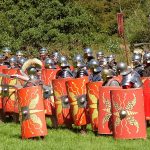
 But the Christian who truly steps out to follow Jesus into the dark and hellish places of earth will experience great difficulties, trials, and roadblocks in life. Such Christians will be called to love those they would rather hate, to forgive those who deserve nothing but death, to be patient with those who are rude and condescending, and to serve those who are the least enjoyable to be around.
But the Christian who truly steps out to follow Jesus into the dark and hellish places of earth will experience great difficulties, trials, and roadblocks in life. Such Christians will be called to love those they would rather hate, to forgive those who deserve nothing but death, to be patient with those who are rude and condescending, and to serve those who are the least enjoyable to be around.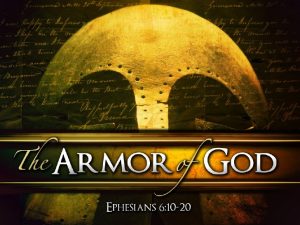 Therefore, since Christians who seek to follow Jesus into this world will face the resistance and struggles of spiritual warfare, it is imperative for Christians to know what is involved in spiritual warfare and how we can prepare ourselves to stand in the midst of this struggle.
Therefore, since Christians who seek to follow Jesus into this world will face the resistance and struggles of spiritual warfare, it is imperative for Christians to know what is involved in spiritual warfare and how we can prepare ourselves to stand in the midst of this struggle. The movie “Hacksaw Ridge” is a true story about Private Desmond Doss. He was drafted into the army for World War II, but since he was a pacifist, he refused to carry a gun or shoot others. However, he wanted to serve his country and do his part. He ended up earning the Congressional Medal of Honor for saving 75 fellow soldiers in the Battle of Okinawa, all without firing a single shot.
The movie “Hacksaw Ridge” is a true story about Private Desmond Doss. He was drafted into the army for World War II, but since he was a pacifist, he refused to carry a gun or shoot others. However, he wanted to serve his country and do his part. He ended up earning the Congressional Medal of Honor for saving 75 fellow soldiers in the Battle of Okinawa, all without firing a single shot. The reason is that although we are plugged into the power of God, there are things in our life that restrict its flow. Picture your life as a spiritual fuse box.
The reason is that although we are plugged into the power of God, there are things in our life that restrict its flow. Picture your life as a spiritual fuse box. After taking their oath of service, they were branded or marked with the letters SPQR, which was a Latin acronym showing that the soldier belonged to the “Senate and People of Rome.”
After taking their oath of service, they were branded or marked with the letters SPQR, which was a Latin acronym showing that the soldier belonged to the “Senate and People of Rome.”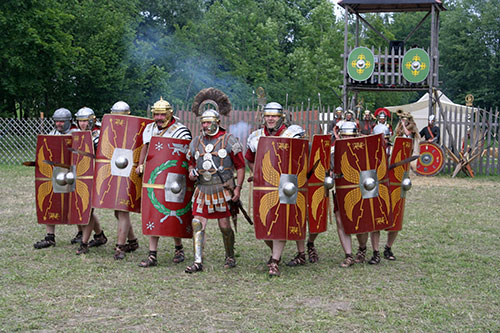
 This is not physical strength Paul has in mind, but spiritual. He wants us to exercise and work out spiritually. But just as with physical body building, spiritual strength training does not happen naturally. You do not become physically strong by sitting in a couch watching TV, and you do not become spiritually strong by sitting in a pew watching a Bible teacher. You will only become strong by getting up and engaging in strenuous spiritual activity.
This is not physical strength Paul has in mind, but spiritual. He wants us to exercise and work out spiritually. But just as with physical body building, spiritual strength training does not happen naturally. You do not become physically strong by sitting in a couch watching TV, and you do not become spiritually strong by sitting in a pew watching a Bible teacher. You will only become strong by getting up and engaging in strenuous spiritual activity.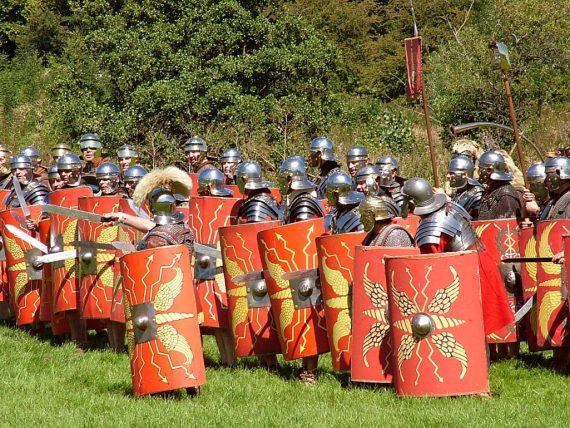


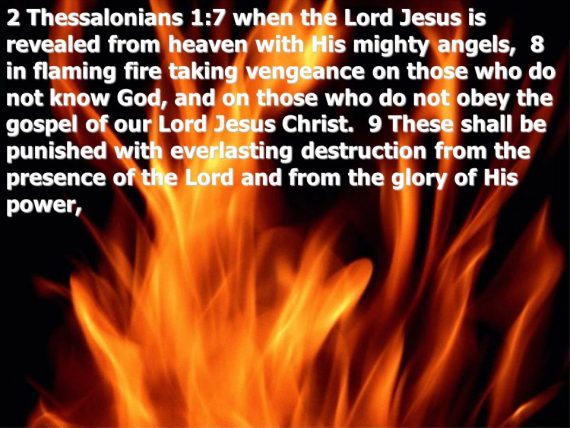 When considered by itself out of context, 2 Thessalonians 1:8-9 seems to conclusively state that God punishes and destroys people forever with flaming fire.
When considered by itself out of context, 2 Thessalonians 1:8-9 seems to conclusively state that God punishes and destroys people forever with flaming fire.
 The word “punishment” is not a good translation of what Paul wrote. A better translation would be “pay the penalty” (Gk., dikēn tisousin). God does not punish people for their sin, but sin bears its own punishment with it. And this punishment of sin can come in the form of a penalty that must be paid or exacted.
The word “punishment” is not a good translation of what Paul wrote. A better translation would be “pay the penalty” (Gk., dikēn tisousin). God does not punish people for their sin, but sin bears its own punishment with it. And this punishment of sin can come in the form of a penalty that must be paid or exacted. It can even come upon believers at the Judgment Seat of Christ when they see everything they have worked for and sought after get burned up as wood, hay, and stubble (1 Cor 3:12-15; cf. “the Day” of 2 Thessalonians 1:10).
It can even come upon believers at the Judgment Seat of Christ when they see everything they have worked for and sought after get burned up as wood, hay, and stubble (1 Cor 3:12-15; cf. “the Day” of 2 Thessalonians 1:10).

 Is John saying that in order to receive eternal life, you need to love other Christians? Lots of other pastors and Bible scholars teach 1 John 3:14 in just this way, but is that really what John meant?
Is John saying that in order to receive eternal life, you need to love other Christians? Lots of other pastors and Bible scholars teach 1 John 3:14 in just this way, but is that really what John meant?



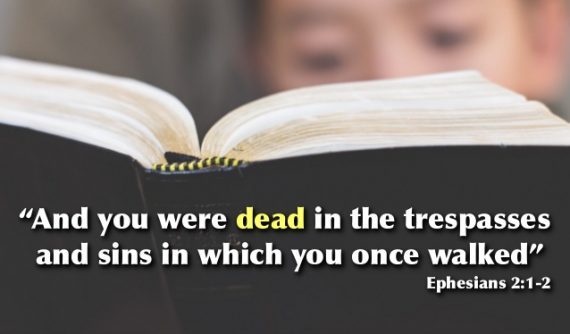
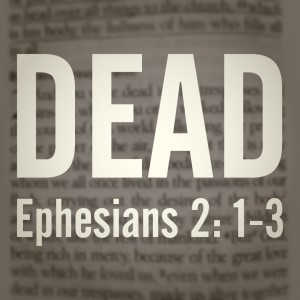 This entire line of thought is completely foreign to what Paul had in mind when he wrote Ephesians 2.
This entire line of thought is completely foreign to what Paul had in mind when he wrote Ephesians 2.
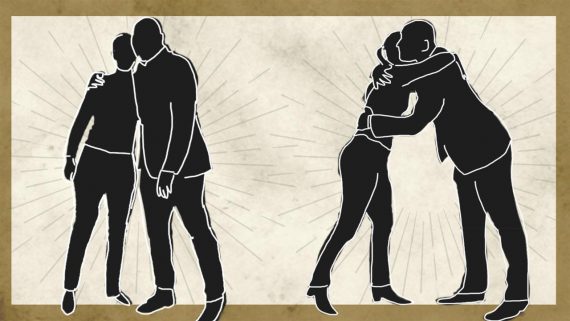
 This is what it means to be “dead in sins.” We are surrounded by an atmosphere, a system, a world of sin, which leads to death … death through murder, warfare, hatred, killing, condemning, scapegoating, and all things related to this.
This is what it means to be “dead in sins.” We are surrounded by an atmosphere, a system, a world of sin, which leads to death … death through murder, warfare, hatred, killing, condemning, scapegoating, and all things related to this.